On August 4, 1914, the British declared war on Germany. The first major battle of the war was an attempt by the British Expeditionary Forces to push back the Germans along the Franco-Belgian border on August 22. The French needed to prevent the German 1st Army over-running the border at Chareleroi. The British agreed to hold the Mons-Charleroi Canal for twenty-four hours to protect the French’s flank. The British Expeditionary Forces consisted of 80,000 men, 40,000 of whom dug in at Mons.
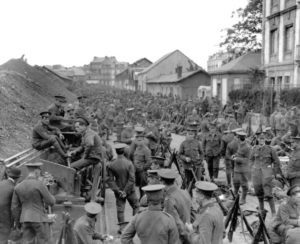
In the next 48 hours, they would lose approximately 7,800 men.
The battles during the early part of this war were like something out of the 19th century or a steampunk novel. Sabers against lances, men on horseback fighting like knights, even men on bicycles joining in, advancing to the sounds of drums and fifes. Later, as the war dragged on hopelessly, the battles would become the worst parts of a dystopian novel, with blood, mud, and men living in holes in the ground.
At first, the Germans advanced in close ‘parade’ form which made them easy targets for the British rifles. The firing was so rapid some Germans thought they were facing machine gun fire. They retreated but tried again in a looser formation. This time, the British were nearly overrun. Two Victoria Crosses, one posthumous, would be awarded to men who stayed by their guns even after their comrades were killed. Eventually, the French broke. Without protection on their flank, the British could not hold on.
By 3 o’clock on the 23rd, the British position had become impossible to defend after so many losses. The order came to retreat. This meant fighting rearguard actions, some of which were devastating. One battalion lost 80 percent of their men. They reached their new defensive positions but were quickly driven out of them again. The Great Retreat, as it came to be known, would take two weeks. The disorganized and confused troops, ill-supplied, walked back from the border almost as far as Paris, fighting constant small battles with the Germans all along the way.
And yet, it was the Germans who seemed most disheartened by the battle. They had been lead to expect an easy victory over the French and British forces. Instead, they’d been met with notable courage and steadfast hearts. That would be enough of a miracle, one would think, but no. Around the Battle of Mons arose a most remarkable legend, one that would continue to put heart into British soldiers for years to come.
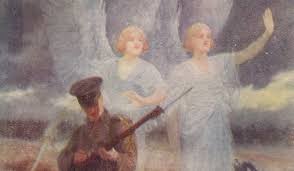
What were the roots of this story and why was it taken so seriously by not only the ‘ ‘umble British Tommy’ but by religious leaders and others back home?
When news of the Great Retreat came to England, people were devastated. They’d believed that either the Germans would surrender immediately or run away when confronted by British troops. They had great faith in the power of the Army, which had won so many famous wars over the last 100 years. The psychological shock plus the mourning for so many lost men was heartbreaking.
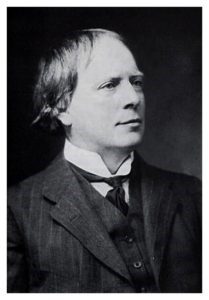 One author tried to cheer himself by writing a story about the retreat, rather in the style of newspaper reportage of the era. His name was Arthur Machen, a professional writer since 1884. He wrote books, articles and translated the Memoirs of Casanova. He also wrote some novels and novellas in a horrific vein, praised by such gifted people as Arthur Conan Doyle, H.P. Lovecraft, and Stephen King. Upon the death of Machen’s first wife, he became interested in the occult, as were many people in England and the USA at the time. Vehemently supportive of the war effort, he published invented ‘atrocity’ stories, encouraged by the services in order to encourage enlistment. Upon hearing of the Great Retreat, he later said ‘…And I suppose that in the first place it was to comfort myself that I thought of the story of the Bowmen, and wrote it in the early days of September (1914).”
One author tried to cheer himself by writing a story about the retreat, rather in the style of newspaper reportage of the era. His name was Arthur Machen, a professional writer since 1884. He wrote books, articles and translated the Memoirs of Casanova. He also wrote some novels and novellas in a horrific vein, praised by such gifted people as Arthur Conan Doyle, H.P. Lovecraft, and Stephen King. Upon the death of Machen’s first wife, he became interested in the occult, as were many people in England and the USA at the time. Vehemently supportive of the war effort, he published invented ‘atrocity’ stories, encouraged by the services in order to encourage enlistment. Upon hearing of the Great Retreat, he later said ‘…And I suppose that in the first place it was to comfort myself that I thought of the story of the Bowmen, and wrote it in the early days of September (1914).”
Machen’s story, The Bowmen, depicts a group of British soldiers pinned down during the Battle of Mons, about to be overrun, after a long day’s fighting, by 10,000 German troops. They set themselves to fight to the last man. One, better educated than the others, remembers seeing a Latin motto on some plates at a vegetarian restaurant and he repeats it aloud — Adsit Anglis Sanctus Georgius (“May St. George be a present help to the English.”). As if in answer, he hears voices speaking in older English than his own:
“Ha! Messire, ha! sweet Saint, grant us good deliverance!”
“St. George for merry England!”
“Harow! Harow! Monseigneur St. George, succor us!”
“Ha! St. George! Ha! St. George! a long bow and a strong bow.”
“Heaven’s Knight, aid us!”
The Educated Soldier fires his weapon, listening all the while to these voices, until a fellow soldier forces him to stop. For the Germans have fallen in their ranks as if mown down by far superior forces. The story leads one to infer that the soldiers were saved by Archers of Agincourt who appeared at the call of St. George, patron saint of England.
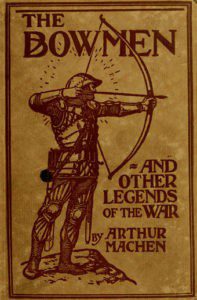 The story was published on September 29th, 1914 and immediately the public responded by assuming that Machen’s story was factual, despite his denials. Even those denials were considered as somehow being more confirmatory than the opposite. The spiritualist magazine, Light, wrote in April of the following year: “Whether Mr. Machen’s story was pure invention or not, it was certainly stated in some quarters that a curious phenomenon had been witnessed by several officers and men in connection with the retreat from Mons. It took the form of a strange cloud interposed between the Germans and the British. Other wonders were heard or seen in connection with this cloud which, it seems, had the effect of protecting the British against the overwhelming hordes of the enemy.”
The story was published on September 29th, 1914 and immediately the public responded by assuming that Machen’s story was factual, despite his denials. Even those denials were considered as somehow being more confirmatory than the opposite. The spiritualist magazine, Light, wrote in April of the following year: “Whether Mr. Machen’s story was pure invention or not, it was certainly stated in some quarters that a curious phenomenon had been witnessed by several officers and men in connection with the retreat from Mons. It took the form of a strange cloud interposed between the Germans and the British. Other wonders were heard or seen in connection with this cloud which, it seems, had the effect of protecting the British against the overwhelming hordes of the enemy.”
Later on, the Society for Psychical Research concluded that there was no reason to think the ‘Angel of Mons’ was a true story but by then it was too late. It became widely discussed, both in the Army and at home in England, that at some point during the Battle or the Retreat, soldiers had witnessed ‘glowing figures’ in the sky, pointing the way to safety or, possibly, serving as protectors for the wounded. Soldiers present at the battle – or who claimed to have been – testified that they’d been witnesses to supernatural help, brought by these mysterious and shifting figures. The story spread like mad through the Armed Forces, with greater detail being added with every re-telling.
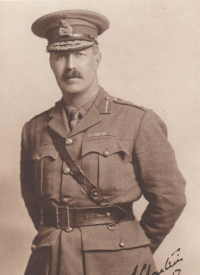 One of the supports for the story being true comes from a diary written by Brigadier-General John Charteris, the Chief Intelligence Officer at GHQ (5th September,1914) *prior* to publication of the ‘The Bowmen’. He wrote: “Then there is the story of the “Angels of Mons” going strong through the 2nd Corps, of how the angel of the Lord on the traditional white horse, and clad all in white with flaming sword, faced the advancing Germans at Mons and forbade their further progress. Men’s nerves and imagination play weird pranks in these strenuous times. All the same the angel at Mons interests me. I cannot find out how the legend arose.”
One of the supports for the story being true comes from a diary written by Brigadier-General John Charteris, the Chief Intelligence Officer at GHQ (5th September,1914) *prior* to publication of the ‘The Bowmen’. He wrote: “Then there is the story of the “Angels of Mons” going strong through the 2nd Corps, of how the angel of the Lord on the traditional white horse, and clad all in white with flaming sword, faced the advancing Germans at Mons and forbade their further progress. Men’s nerves and imagination play weird pranks in these strenuous times. All the same the angel at Mons interests me. I cannot find out how the legend arose.”
Sounds like confirmation…except for the fact that Charteris was an Intelligence man through and through and was often involved in the creation of propaganda to hearten the British troops. Did he adopt Machen’s story for this purpose?
More to the point is this from a soldier involved in the retreat: We marched all day long, miles and miles it seemed, probably owing to the fact that we had had no sleep at all since Saturday the 22nd, and had had very little food to eat, and the marching discipline was not good. I myself frequently felt very sick*. Later he describes literally falling asleep while on the march. They walked for days, exhausted, starving, men dropping all around them, in a nightmare from which there was no waking. Anyone under those circumstances, after a violent battle, could be forgiven for having seen much stranger sights than angels or the spirits of knights in armor.
*Corporal Bernard John Denore, 1st Royal Berks Regt., 6th Brigade, 2nd Division, I Army Corps.
The story that may have started it all:
http://www.eastoftheweb.com/short-stories/UBooks/Bowm849.shtml